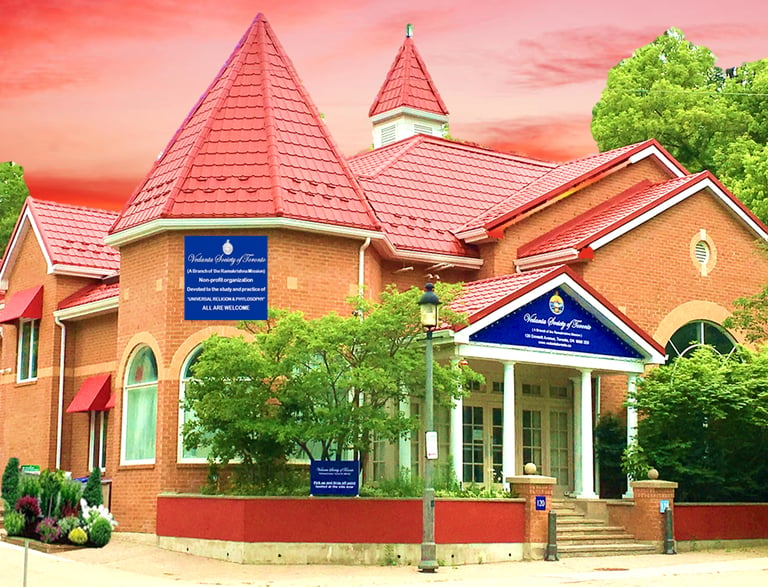History
Background
It is perhaps important to know about the background of Toronto before we start the history of the Vedanta Society of Toronto. Canada is a nation of immigrants; the founder immigrants came to Canada from Britain, France and other European countries, and brought the tenets of their practicing faiths with them. Their religious affiliations were predominantly Christian, split into denominations such as Catholics, Anglicans, Presbyterians, Baptists and Methodists, each with their respective doctrines, traditions and rituals. Native Spirituality was not recognized as such. The history of the United States of America had somewhat similar beginning as well.
In the nineteenth century, the West experienced significant social and cultural changes after its extensive material prosperity through industrial production and marketing. Whatever may be the reason, the circumstances led to the staging of the World's Parliament of Religion in Chicago, in 1893. Most of the followers of Vedanta are familiar with the arrival of Swami Vivekananda in Vancouver on his way to attend the Parliament of World's Religions. The impact of this historic event in the West is well-known.


Pan American Congress of Education and Religion :
What is not known extensively however is, two years after the Chicago event, Swamiji was invited to attend the Pan American Congress of Education and Religion in Toronto on July 18, 1895. This congress was believed to be the direct outcome of the success of Chicago's Parliament of Religions and was to be held in “the Pavilion” in the Horticultural Garden, a concert hall. The mandate of the conference was to dispel sectarian differences, and focus on the common Christian values among the people of both Americas. It is interesting to note that this conference has no record in the history of Toronto except the daily coverage of the proceedings in local newspapers at the time. We came to know about this conference through Swamiji’s correspondence with Dr. Paul Carus and Mrs. Ole Bull. Toronto event fell through as the Clergymen in the committee unanimously opposed to Swamiji's participation in the congress. We do not know what Swamiji's message would have been, but we do know that the ideas of Sri Ramakrishna was to reach Toronto, perhaps quietly to inspire people to start the Vedanta Society of Toronto.
In 1895 Canada was still younger, less experienced and more conservative compared to the United States. With increased demographical diversity in Canadian population in the past few decades, noticeable changes have taken place socially and politically, mainly in Ontario. In the nineteen sixties the population of immigrants of Indian origin (India, West Indies, Africa and Sri Lanka) had increased significantly and brought the tenets of their practicing faiths as well with their respective doctrines, traditions and rituals.
Among these immigrants were Hindus, many of whom were from academic communities, as students or faculty members. The need of spiritual congregation was manifested in the minds of those people. Various interests were expressed by various group members based on the variety of personal perspectives of Hinduism. Some wanted to maintain the traditions and rituals of Hinduism as they experienced in their families, others felt that the perspective needs to change in Canadian context, and again some others felt that it is important to teach universal ideas of Hinduism to their children along with Indian culture. It was also felt that exposure to other religions such as Buddhism and Christianity was important in the pluralistic society. Finally, there was a consensus to form a society to study and practice Vedanta.
Inauguration :
In 1968, Swami Ranganathanadaji Maharaj inaugurated the society. In Swami's own words in the Silver Jubilee souvenir of the society "I well remember Swami Bhasyananda's efforts to start a Vedanta Society in Toronto and my inauguration of the same in November 1968, in his company and in the company of a good number of devotees, in the course of my one year and a half long lecture tour of North and South America, in 1968-69."
The society was officially inaugurated on November 30, 1968. The ceremony took place at the YWCA building on 21 McGill Street. It was presided over by Swami Bhasyananda and the chief guest was Swami Ranganathananda.
Humble Beginning :
In the beginning the programme started with Vedic chanting, followed by silent meditation and reading from the Gospel of Sri Ramakrishna. Later, monthly music sessions including Ramnam and other hymns were included along with a study circle. People from diverse background showed interest in the study of Vedanta, therefore a repertoire of hymns was collected along with English hymns.
